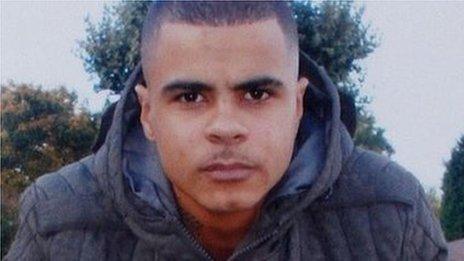Mark Duggan's aunt urges 'no violence'
- Published
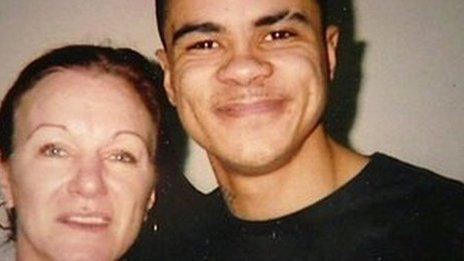
Mark Duggan's aunt Carole said the family will carry on seeking answers
Mark Duggan's aunt has said the family will fight the inquest decision of lawful killing "through the courts" and has called for calm.
On Wednesday, a jury concluded Mr Duggan was lawfully killed when he was shot dead by police in August 2011.
Met Police Commissioner Sir Bernard Hogan-Howe thanked Mr Duggan's family for "expressing their desire to pursue their case peacefully".
Mr Duggan's death in Tottenham, north London, sparked widespread disorder.
The killing of the 29-year-old was followed by protests which descended into looting and rioting in the capital and spread to other cities in England.
Earlier, his aunt Carole Duggan said: "No demonstrations, no more violence, we will have to fight this and go through the struggle peacefully to get justice."
'Tremendous determination'
Sir Bernard said: "I would first like to record my thanks to Mark's family for expressing their desire to pursue their case peacefully, and discouraging further demonstrations or protests.
"That's a very dignified way to respond in what are clearly very distressing circumstances for them."
Sir Bernard Hogan-Howe says the Metropolitan Police needs to "look and feel like the people of London"
Following the conclusion of the inquest, the family reacted with anger to the jury's decision that officers had acted within the law.
Ms Duggan has called for the Independent Police Complaints Commission to review the case.
Sir Bernard said meetings with political and community leaders on Thursday had shown him the "tremendous determination there is to strengthen relationships with the Met".
David Cameron: "I hope people can react calmly"
"The leaders I met are committed to work hard with us to ensure that their community is not disrupted now as it was in 2011," he said.
He added the force wanted "more black Londoners amongst our neighbourhood police officers" and had "more to do to further reduce the use of stop and search".
Prime Minster David Cameron welcomed Carole Duggan's message of restraint, but stressed the outcome of the inquest had to be respected.
'Great regret'
He said: "These issues raise very strong emotions but I hope people can react calmly and recognise that we have proper judicial processes in this country and they are the ones that must be followed.
"I very much respect Mark Duggan's aunt for saying pursue the case in the courts and not the street."
Mr Cameron did admit more work was needed to improve race relations.
"There's still racial prejudice in our country, there's still discrimination," he said.
"But I think what you can see is governments...trying to break down these barriers and end discrimination and make sure people are valued for the passion in their heart and the thoughts their head, rather than the colour of their skin."
Meanwhile it has emerged the names of the ten jurors who delivered the verdict are to remain confidential.
The seven women and three men, who come from the north London boroughs of Barnet, Brent, Enfield, Harrow and Haringey, have been offered counselling which is routine in cases deemed to be of a sensitive nature.
During a brief hearing at the Royal Courts of Justice on Thursday, lawyers for the family did not say whether they would challenge the court's conclusion.
Under the law, Mr Duggan's family have three months to bring a judicial review at the High Court, although his aunt said the four-month inquest had left them devastated.
"The family are still in shock right now about the results of yesterday," she said.
"We are in turmoil and we don't really know what is going to happen at this point."
Mark Duggan's family are planning to hold a candlelit vigil for him this weekend.
'Peaceful struggle'
The Reverend Nims Obunge, a pastor in Tottenham who knows the family, said: "It is a vigil in remembrance and respecting the life or the death of Mark Duggan.
"His family, his children, will be there and we don't expect anybody to come... to create unrest or anarchy."
BBC News correspondent Mike Sergeant, who is in Tottenham, said a friend of Mr Duggan had emphasised the damage that the violence in 2011 did not just to the police officers involved, but to all of the businesses and people in the wider community.
He said there was no desire to see that repeated.
Carole Duggan: "The struggle will continue peacefully"
Ms Duggan confirmed there are no plans at present for the family to discuss the case with police officials.
Earlier on Thursday the IPCC said it was "working closely with the Duggan family solicitor to arrange an urgent family meeting" and it was hoped this would take place "in the early part of next week".
After the inquest concluded, Ms Duggan took to the steps of the Royal Courts of Justice and shouted: "No justice, no peace."
She explained the slogan was about the continued fight to discover what happened to her nephew.
"We will want answers. So it is like the struggle will go on, peacefully," she said.
"But we will not give peace to the authorities until we get justice.
"We will still be here for as long as it takes."
However the Met's Assistant Commissioner Mark Rowley thinks a further legal appeal is not necessary.
"The legal process has concluded, a coroner's court jury has come to verdict. There is always the High Court to appeal and that is their decision," he said.
"I think we now need to look forward and work with communities on how we can strengthen things further, building on the work we have done on the last two years."
Boris Johnson: "Those split second decisions are all the more difficult if someone is clearly carrying a lethal weapon"
As part of this process the Met is to trial firearms officers wearing video cameras from 1 April in an attempt to be "more open".
Mr Rowley will be questioned by the Home Affairs Select Committee on Tuesday on police communications and lessons learned.
The Mayor of London Boris Johnson stressed it was important to note that armed response units operate in highly pressurised situations.
"What I hope that underscores for us in London is the massive restraint of our police in the way they handle the use of force," he said.
He stated that armed police were called out around 10,000 times in the last four years but had only fired on six occasions.
- Published9 January 2014
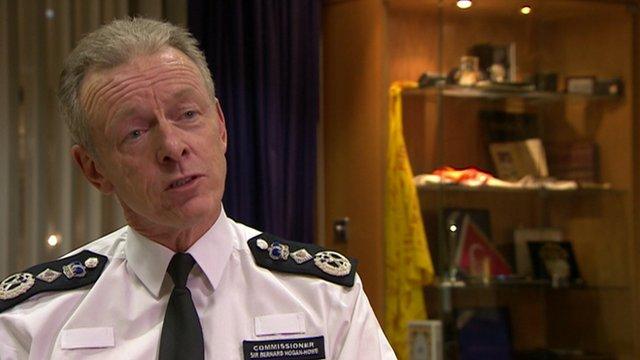
- Published9 January 2014
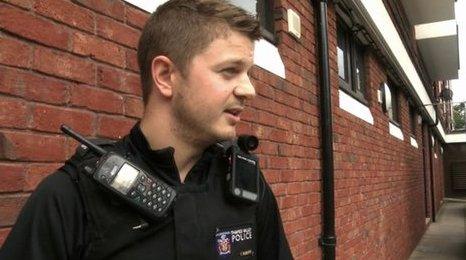
- Published9 January 2014
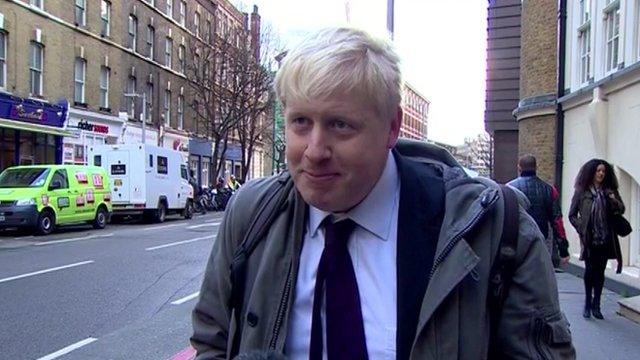
- Published9 January 2014
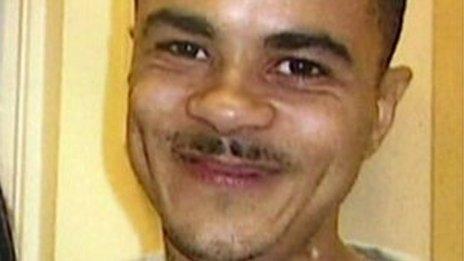
- Published8 January 2014
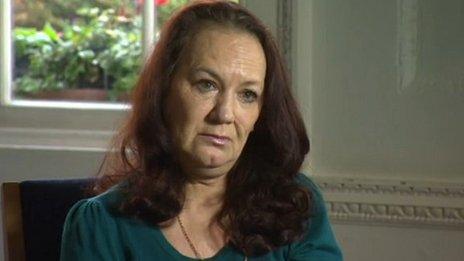
- Published8 January 2014
